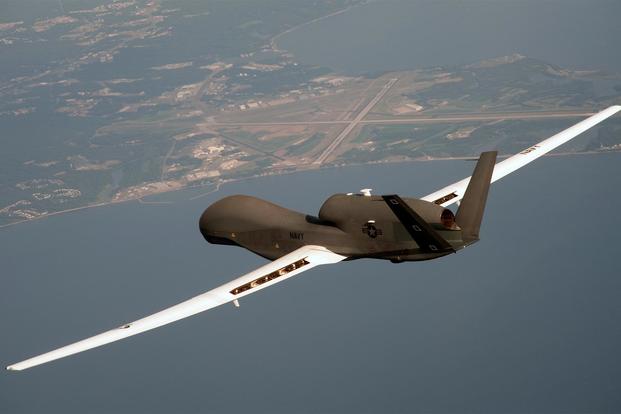Lawmakers want to make sure the U.S. Air Force can keep the right mix of intelligence, surveillance and reconnaissance aircraft over the next few years, given the anticipated shutdown of the MQ-9 Reaper production line and the proposed retirement of the service's long-range Global Hawk drones.
In its markup of the fiscal 2021 National Defense Authorization Act legislation, the House Armed Services Tactical Air and Land Forces subcommittee said the Air Force can retire a portion of its Global Hawk fleet, as long as it gets the proper sign-off from top Defense Department officials to ensure it does not create a capability gap in the service's mission.
Read Next: Police: Army Vet Empties Gun at Woman's SUV in Dick's Sporting Goods Parking Lot
In its budget submission published in February, the Air Force said it would retire 24 RQ-4 Global Hawk drones, some of which are used as a networking Battlefield Airborne Communications Node, or BACN. The service specifically proposed shuttering 21 of its older Block 20 and Block 30 RQ-4s, and three BACN EQ-4Bs.
The subcommittee said it will prohibit those retirements until Under Secretary of Defense for Acquisition and Sustainment Ellen Lord can assure that any capability developed to replace the RQ-4 aircraft is cheaper to maintain and sustain. In addition, Gen. John Hyten, vice chairman of the Joint Chiefs of Staff, must stipulate in his Joint Requirements Oversight Council role that the potential replacement would result "in equal or greater capability available to the commanders of the combatant commands," according to the legislation.
Alternatively, Defense Secretary Mark Esper could make these decisions, it adds.
House Armed Services Committee members said Gen. Kenneth McKenzie, head of U.S. Central Command, also must OK the retirement of the EQ-4 aircraft being used as communication nodes. In its budget request, the service proposed a new buy of five E-11A manned BACN aircraft to replace the EQ-4s; it lost an E-11 in Afghanistan earlier this year.
The legislation's language reveals lawmakers' reluctance to back the Air Force's Advanced Battle Management System (ABMS), which is designed to leverage air and space platforms to fuse together intelligence data from around the world, once it is constructed. The Government Accountability Office in April released its analysis of ABMS, stating the Air Force has yet to prove how the intricate network will work.
"The authorities of Air Force offices to plan and execute ABMS efforts are not fully defined," the GAO said. "Unless addressed, the unclear decision-making authorities will hinder the Air Force's ability to effectively execute and assess ABMS development across multiple organizations."
The lawmakers took that a step further Monday, stating they will cut the ABMS funding effort by 50% if the Air Force moves ahead with the RQ-4 retirements.
"Right now, none of those conditions have been met to give us any sort of peace of mind that the Air Force's fiscal year 2021 [move] to divest Block 30 is [an] acceptable risk," said a committee aide speaking to reporters on background.
The Air Force wants over $300 million -- more than double last year's enacted funding of $144 million -- for the ABMS project, according to the budget request.
Under a previous moratorium, the service cannot retire its E-8 Joint Surveillance Target Radar Attack System (JSTARS) aircraft until a comparable capability is identified and can be made readily available, lawmakers reiterated. ABMS is intended to replace, to some degree, JSTARS.
Lawmakers want more attention paid to the increased global use of drones, which is why they're also asking for a drone roadmap -- including future purchases and sustainment -- to coincide with the service's outlook.
The Air Force's "[budget] request proposed immediate divestment of all RQ-4 Global Hawk Block 30 multi-intelligence aircraft, as well as an end to the MQ-9 Reaper production line in fiscal year 2020 without any time to allow for adequate supply chain management planning," lawmakers said in the legislation. "While these changes may align with long-term Air Force strategy, the absence of such a strategy incorporating both current and future capabilities concerns the committee.
"The Secretary of the Air Force [must] provide a comprehensive strategy for Air Force airborne intelligence, surveillance, and reconnaissance (ISR) to ensure alignment between requirements, future Air Force budget submissions, and authorization of appropriations," they added.
-- Oriana Pawlyk can be reached at oriana.pawlyk@military.com. Follow her on Twitter at @Oriana0214.
Related: Air Force to Send More than 100 Planes to Boneyard as it Invests in Future Fighters












